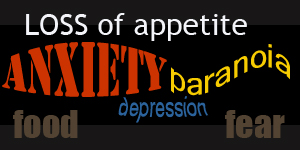 Anxiety is a snowball rolling down a hill. That's a cliche, I'm aware. I don't know how to accurately frame it in the right physiological terms, but I know how it feels, and it feels kind of stupid -- like a clumsy cliche. I won't pull out the $30 workbook a therapist made me buy years ago, but I'll do my best. It starts with an errant thought -- a rickety wheel sliding off a safe train into the imagination's most dangerous corners, flooding the body with false signs of warning, gaining momentum in thin shards of half-remembered facts and hearty swirls of lunatic fiction. Regardless of the worry's origins, sometimes, rarely, it's so bad, you can't really sleep. You wake up preposterously early, eyes so open they might shoot out of your head. You drink tea and watch the sun rise, but everything feels terribly wrong. A leg won't stop shaking. There are a million things to do but you can't start doing any of them. Something is stuck. You're overwhelmed, consumed, pouring over whatever is troubling you at the expense of every other concern -- so focused, in a sense, that you're distracted.
Anxiety is a snowball rolling down a hill. That's a cliche, I'm aware. I don't know how to accurately frame it in the right physiological terms, but I know how it feels, and it feels kind of stupid -- like a clumsy cliche. I won't pull out the $30 workbook a therapist made me buy years ago, but I'll do my best. It starts with an errant thought -- a rickety wheel sliding off a safe train into the imagination's most dangerous corners, flooding the body with false signs of warning, gaining momentum in thin shards of half-remembered facts and hearty swirls of lunatic fiction. Regardless of the worry's origins, sometimes, rarely, it's so bad, you can't really sleep. You wake up preposterously early, eyes so open they might shoot out of your head. You drink tea and watch the sun rise, but everything feels terribly wrong. A leg won't stop shaking. There are a million things to do but you can't start doing any of them. Something is stuck. You're overwhelmed, consumed, pouring over whatever is troubling you at the expense of every other concern -- so focused, in a sense, that you're distracted.
Sleep is important from a health standpoint, but it's also a little boring. I don't mind losing a little bit of it here and there -- especially for a good cause. Appetite, on the other hand, is a different matter altogether.
I was a senior in college the first time mine was threatened. The catalyst was utterly mundane, the sticky, drawn-out fizzling of a relationship that probably shouldn't have started in the first place. Suddenly rudder-less, I flipped out, laid low, wore the same jeans for two weeks straight, and stopped eating. After a couple of days, I started again, very gingerly. I subsisted almost entirely -- two meals a day, pretty much every day -- on packages of Lipton's noodle soup. I'm not sure why I decided to submerge my strain and sorrow in salty dyed broth and slippery strands, but in retrospect the choice makes sense. Soup suited an emotional invalid in need of rehabilitation. It was also austere, a form of self-doled punishment for my melodramatic pining. I couldn't eat anything else. I tried to have a veggie burger with fries at an on-campus dining hall. The first bite was unswallowable, dry and mealy. The rest of the sandwich fell apart in my hands. The ketchup was a sickly puddle, like melted make-up. The thumb-sized fries were soggy, unpalatable to begin with. I pushed the plate away and went home for soup. Towards the end of the episode, I began gussying up my steaming bowls with vegetables smuggled from the dining hall salad bars. I'm not sure what actually eventually caused me to calm down. I just woke up one day feeling better.
If dieting, not convalescence, had been my aim, the two weeks of biting nails and sucking soup would have paid off. Somewhere along the way, I had lost ten pounds. Once-tight pants now had a flowing, Hammer-esque cut. I bought new jeans. And I started eating real food again. It was February in Ohio, in a tiny town just ten minutes from Lake Erie. My house-mates and I threw a barbecue on the snow-blanketed hill behind our sprawling white house. The air outside was wet, cold, and invasive, but everyone bundled up. I wore a silly apron and grilled myself a shark steak I'd purchased from the nearby IGA. It was fishy but I relished it on a bun with ketchup, mayonnaise, mustard, and Srirachi sauce. I started drinking again. Cans of beer have never since tasted quite so good. I had one after another, and I thawed out, and saw a little bit of amazing in everything.
These two weeks, I'd later learn, were a preamble, a canape, really. I had a problem, but I didn't know it yet. I soon graduated, from slipping past traumatizing break-ups to fumbling with larger, more complicated issues that sadly proved much more of a challenge to my increasingly ambitious cooking and eating habits.